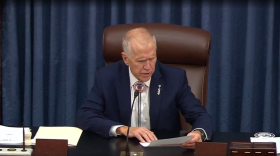Republican Senator Thom Tillis and Democratic challenger Cal Cunningham sparred over the pandemic, systemic racism and each other’s records Monday night during a socially distanced debate.
Tillis, who is seeking a second term, was largely the aggressor in their first televised debate for the seat in a closely watched race in the closely divided state. Democrats need to win four additional seats in November to ensure control in the Senate.
Here's what stood out from the first of their three scheduled debates:
Coronavirus a main topic
The pandemic consumed about half of the hour-long forum. And early on Tillis tried to highlight a contrast between the candidates, turning to the latest relief package considered by the Senate.
"That bill that I voted on last week had additional resources for vaccine research, (Cunningham) said he would vote against it," Tillis said. "That bill would actually provide certainty to people who desperately need unemployment that is about to run out in a couple of weeks. We have to actually manage a crisis and I believe Cal will look back at the no vote he would have cast last week as a mistake."
Cunningham, a Raleigh attorney and Iraq War veteran who ran for Senate 10 years ago, said the legislation wouldn’t have done enough to help the unemployed, or provide COVID-related healthcare.
Tillis, a former state House speaker who beat incumbent Kay Hagan six years ago, said he's worked hard while in Washington to get relief funds to North Carolina's schools and for vaccine research. He said President Donald Trump also took a "good first step" early on by imposing a travel ban from China.
Without directly mentioning Trump, Cunningham said, "I think that we are seeing and experiencing an unprecedented failure of leadership in this country."
Cal Cunningham criticizes America's response to COVID-19, calling for medicaid expansion, increased unemployment assistance, and deployment of the Defense Production Act. #NCSenateDebate pic.twitter.com/r4VyMtr7Nm
— WUNC (@wunc) September 14, 2020
Cunningham hesitant about vaccine
Both men were asked if they would take a vaccine for COVID-19 should one come available this year. Tillis said as soon as vulnerable populations and frontline workers were inoculated, that he'd get in line.
Cunningham said he would be concerned about receiving a vaccine at year's end unless many questions were answered, especially by the U.S. Food and Drug Administration. He said he's worried about the influence of politics and big money in Washington in the decision-making related to public health.
“Yes, I would be hesitant, but I'm going to ask a lot of questions. That would be incumbent upon all of us," Cunningham said. "I think we have seen entirely too many times and especially in recent years – politics – intervening in what should be driven by health and science."
He told reporters afterward in a conference call that he would take the vaccine if the public health officials sign off on its efficacy.
Still, in the moment, Tillis called Cunningham's hesitation irresponsible.
"We just heard a candidate for the U.S. Senate, look into the camera and tell 10 million North Carolinians, he would be hesitant to take a vaccine," Tillis said. "In the middle of a crisis you don't undermine an effective process of the FDA."

Not a lot of fireworks
Aside from the exchange concerning a potential vaccine, the debate was void of any real fireworks or viral moments.
Tillis did mention U.S. House Speaker Nancy Pelosi five times and Senate Minority Leader Chuck Schumer seven – as he continues to try to tether Cunningham to divisive national figures. Tillis also said Cunningham failed to keep his word, first as student body President at UNC-Chapel Hill, and later as a young state lawmaker.
"You're well educated, well-articulated, looked into the camera and said 'I pledge not to raise your taxes.' And then a few months later, he broke that pledge," Tillis said. "Cal has said anything he could to get elected."
Cunningham responded by saying Tillis is a flip-flopper. And he cited Tillis’ changing positions on immigration, and his about-face in 2019 after bucking the President.
"I mean let me borrow a moment from scripture here: He'd be able to see the speck of dust in my eye better if he got the plank out of his own – seriously," Cunningham said.
On racial injustice, both candidates recognized systemic racism in society. Cunningham said he had a plan to reform police standards. Tillis blamed Democrats for failing to consider the reform bill by the Senate's lone Black Republican, South Carolina's Tim Scott.
Looking ahead
There was some agreement. Both men expressed confidence in the U.S. Postal Service to handle the influx of mail-in ballots in the state later this fall. Tillis said he's already requested his ballot. Cunningham plans to vote early, in-person.
Q: Do you personally trust mail in voting?
— WUNC (@wunc) September 14, 2020
A:
Tillis: 100% I already requested my ballot and would encourage everyone in North Carolina to vote by absentee.
Cunningham: Yes, I completely trust it. I will probably be early voting in person, though. #NCSenateDebate pic.twitter.com/r5HDb50ryv
Cunningham's campaign has outraised Tillis for two consecutive quarters, but both sides should have little problem getting messages out in the final weeks. And Tillis and Cunningham already have been the subjects of $56 million in outside spending during the campaign, according to the Center for Responsive Politics.
Outside journalists weren’t permitted to watch the debate within the television station due to safety concerns from COVID-19. The moderator said he and the candidates entered the studio with masks and were properly distanced. Additional TV debates are set for Sept. 22 and Oct. 1.
WUNC Digital Producer Mitchell Northam contributed to this story.









